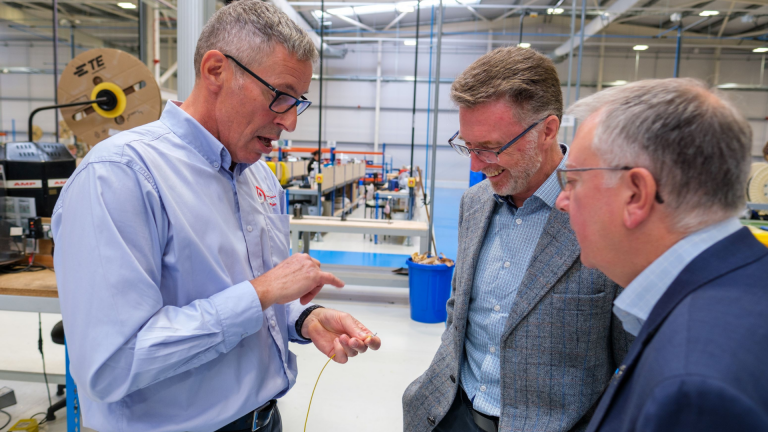Zebra Print Group donates half a ton of materials to support young people in Yorkshire
Gilson Gray appoints head of residential conveyancing
80-seat restaurant approved for redevelopment in Bradford’s Goitside district
Bradford Council has approved plans to convert a century-old building at the junction of Thornton Road and Grattan Road into an 80-seat restaurant. The property, located on the edge of the city centre within the Goitside Conservation Area, was previously occupied by a car valeting business.
The approved application allows for a full change of use, a new glazed frontage, additional side glazing, and two rear doors. The site’s proximity to central Bradford and public transport links was considered sufficient to offset the lack of dedicated parking.
Planning officers confirmed the venue would operate as a restaurant rather than a takeaway, meaning hot food takeaway planning policies did not apply. The development aims to bring renewed activity to an area that is currently seeing substantial regeneration.
Nearby, construction continues on a low-carbon energy centre and Starbucks drive-thru on Thornton Road, with additional plans for a second drive-thru and a data centre awaiting approval. A new church, Sunbridge Road Mission, is also being built close by, signalling ongoing commercial and community investment across the district.
Atlas Copco expands UK footprint with Yorkshire acquisition
Atlas Copco Group has acquired Northern Compressed Air, a Yorkshire-based distributor specialising in the sales, installation, and servicing of compressed air systems.
The business, founded in 2008, employs 15 people who will join Atlas Copco as part of the agreement.
The acquisition strengthens Atlas Copco’s service network in Yorkshire and the north of England, aligning with its broader strategy to grow regional coverage across the UK.
The company will be integrated into the Compressor Technique Service division, which supports industrial clients with maintenance and energy-efficient compressed air solutions.
Financial terms of the deal have not been disclosed.
Sheffield office building to be converted into 40 apartments
Glenbrook Investments has gained approval to convert Commercial House in Sheffield into 40 apartments under permitted development rights.
The five-storey property, located near the Castlegate district, will be redeveloped into a mix of one-, two-, and three-bedroom apartments. The building, once home to Knights Solicitors and originally a Barclays Bank, sits within an area earmarked for major regeneration under the Castlegate masterplan.
The project benefits from strong transport links, with the Sheffield Supertram stop at Fitzalan Square directly opposite and multiple nearby bus routes. The wider area is undergoing significant investment, including the confirmed Harmony Works music hub at the neighbouring Canada House, which will host several regional music education organisations.
Glenbrook is assessing whether to proceed with the development or sell the site to a third-party developer following increased market interest.
Project partners include Urbana as planning consultant, Elwy Group as employer’s agent, Vision Design Group as structural engineer, TPS Consultants for transport, EPS Consulting for geotechnical work, and NoiseAir for acoustic analysis.
Abingdon Health raises £3.3m to accelerate US expansion
Abingdon Health has completed a £3.3 million share placing at 6 pence per share, marking a significant step in its international growth strategy. The AIM-listed diagnostics developer and manufacturer arranged the fundraising through Zeus Capital via an accelerated bookbuild process.
The proceeds will be directed towards expanding operations in the United States and supporting new revenue-generating projects across its contract development and manufacturing operations. Executive chairman Chris Hand subscribed for 500,000 shares as part of the placing.
Completion of the transaction is subject to shareholder approval at a general meeting on 30 October. The company is also offering a separate retail component to raise up to £200,000.
Dr Chris Hand, Executive Chairman of Abingdon Health plc, commented: “I am delighted that we can announce the completion of this Fundraising. Our full service CDMO offering and recently established Abingdon Health USA are both resonating well with customers. This investment will allow us to execute larger projects and expand USA manufacturing activities to promote our growth. I would like to thank current shareholders for their tremendous support and welcome new shareholders to the Company.”
The new capital will strengthen Abingdon’s position in the global diagnostics market as it scales production and deepens its presence in key regions.
Gear4music lifts half-year performance on stronger strategy
Gear4music has reported a sharp rise in first-half revenues, driven by improved marketing execution and better product availability.
For the six months ending 30 September, total revenue climbed 31% year-on-year to £80.7 million. Sales in the UK reached £49.6 million, while revenue from Europe and other international markets rose to £31.1 million, both up by 31%.
Growth momentum continued throughout the period, with sales increasing by 27% in the first quarter and 34% in the second. The company expects earnings before interest, tax, depreciation, and amortisation (EBITDA) of at least £6.5 million for the half-year, more than double the prior year’s result.
Gear4music credited the improvement to its refreshed growth plan, which focused on enhancing marketing efficiency and maintaining stronger stock levels. The retailer also benefited from a more favourable trading environment across its UK and European operations.
The board now anticipates full-year EBITDA to exceed previous forecasts, projecting no less than £13.7 million for the year ending 31 March 2026. With strong year-to-date trading, the company has raised its outlook for the second time this year, reflecting confidence in sustained demand through the peak trading season.
Fintech firm secures £1.5m to modernise tipping management
Automated tipping platform Grateful has secured £1.5 million in seed funding from Calculus Capital to advance its technology for managing and distributing tips in the service sector.
Founded in 2022 in Harrogate and London, Grateful provides a cashless tipping and tronc management system aimed at improving transparency, compliance, and speed of payments for hospitality and retail operators. The platform replaces manual spreadsheets and fragmented systems with automated solutions that manage the flow of tips and gratuities to workers.
The investment will fund the expansion of Grateful’s AI-driven compliance tools, accelerate the rollout of new fintech and money management features, and support entry into additional markets. The company plans to strengthen its position as a leader in digital pay and benefits for frontline employees, a sector affected by increasing administrative complexity and new legal requirements for fair tip distribution under the Employment (Allocation of Tips) Act 2023.
Grateful currently serves over 50,000 users and is integrating with other technology partners to extend its reach across hospitality and service-based industries. The company’s leadership team brings experience in sales software, security, and managed service businesses.
PAYSTRAX expands UK footprint with acquisition of Nochex
PAYSTRAX has completed the acquisition of Nochex, a long-established UK fintech company and one of the country’s earliest online payment service providers.
The deal supports PAYSTRAX’s strategy to grow its UK presence following the company’s authorisation as a UK Payment Institution by the Financial Conduct Authority in 2023. Founded in Lithuania, Paystrax currently serves over 800 merchants across the UK and Europe, providing payment processing solutions designed to enhance transaction efficiency and improve acceptance rates.
Nochex, founded in 2001 and licensed as an Electronic Money Institution by the FCA, has built a strong merchant base and reputation for reliable online payment services. The company will continue to operate under the Nochex brand, retaining its existing team while gaining access to PAYSTRAX’s wider European infrastructure and technology capabilities.
Co-founder and CEO of PAYSTRAX, Johannes Ingi Kolbeinsson, said regarding the acquisition: “While we continue to grow through our own organic efforts, part of our long-term strategy is to expand externally as well, by identifying the right opportunities to complement our business. Nochex has a strong brand heritage, a proven reputation with merchants, and a history of innovation as one of the first online payment service providers in the UK, and we look forward to bringing this legacy into PAYSTRAX and building on it for the future.”
The acquisition strengthens PAYSTRAX’s position in the competitive payments sector and extends its reach across the UK market. It also signals the company’s intent to pursue both organic and acquisition-led growth as part of its European expansion strategy.
Council backing helps manufacturer expand in Kirton
Parkinson Harness Technology has expanded its UK operations with a move to a 10.7-acre site in Kirton, supported by Lincolnshire County Council.
The manufacturer, which specialises in cable harnesses and high-voltage solutions, relocated after outgrowing its previous facility. The new base allows the company to increase production capacity, safeguard skilled roles, and maintain its UK manufacturing footprint.
David Earnshaw, Director of Parkinson Harness Technology, said: “At one point in 2023, the move looked impossible. We were told we didn’t have the funds to go ahead, and the project looked dead in the water. But we didn’t give up, and thanks to the hard work of our staff and the remarkable support of stakeholders – including the county council – we were able to turn the situation around and deliver this fantastic new site in Kirton.
“The facility has crucially allowed us to retain and expand our scale operation here in the UK. That’s one of our unique selling points as a business, enabling us to combine global-scale manufacturing with specialised components and support close to home.”
Lincolnshire County Council, as the landowner, played a key role in securing the site, agreeing commercial terms based on an independent valuation to enable the relocation. The authority’s intervention ensured the business could continue operating in the region, supporting local employment and supply chains.
Cllr Liam Kelly, executive councillor for Growth at Lincolnshire County Council, said: “This success story is exactly why the council holds development land across the county – to help businesses grow, consolidate and thrive when it matters most.
“When Parkinson Harness Technology outgrew their former site, there was little space on the market for them to expand into. By working closely with them, we were able to provide land for a purpose-built site and, when they hit a bump in the road, we were able to provide a commercially acceptable solution to secure investment, high-skilled jobs, and growth for the local economy.”
The Kirton site forms part of the company’s broader growth strategy under parent group Dhoot Transmission, which supplies components to major international manufacturers. The expansion is expected to strengthen the company’s position in the UK market and bolster Lincolnshire’s reputation for advanced manufacturing.











